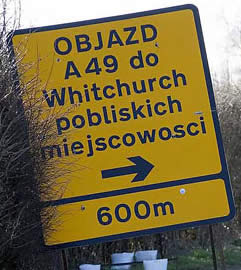Tag questions or question tags are interrogative fragments (tags) added to statements making them into sort of questions. They tend to be used more in colloquial speech and informal writing than in formal writing, and can indicate politeness, emphasis, irony, confidence or lack of it, and uncertainty. Some are rhetorical and an answer is not expected, others invite a response.
In English they come in various forms, for example:
– I like coconut, don’t I?
– You’re tall, aren’t you?
– He’s handsome, isn’t he?
– She said she’d be here, didn’t she?
– It’ll rain tomorrow, won’t it?
– We were away, weren’t we?
– You’d gone, hadn’t you?
– They’ll be there, won’t they?
A simpler tag question used is some varieties of English in innit, a contraction of isn’t it, which could be used for all the examples above. Other English tags include right? and eh? – do you use any others?
Tag questions in Celtic languages can also have quite complex forms which depend on the verb and the subject in the main clause, particularly in Welsh.
Manx
– T’eh braew jiu, nagh vel? (It’s fine today, isn’t it?)
– Hie ad dys y thie oast riyr, nagh jagh? (They went to the pub last night, didn’t they?)
– Bee oo goll magh mairagh, nagh bee? (You’ll go out tomorrow, won’t you?)
Irish
– Tá sé go breá inniu, nach bhfuil? (It’s fine today, isn’t it?)
– Chuaigh siad go dtí an teach tábhairne aréir, nagh ndeachaigh? (They went to the pub last night, didn’t they?)
– Beidh tú ag dul amach amárach, nach bheidh? (You’ll go out tomorrow, won’t you?)
Scottish Gaelic
– Tha i brèagha an diugh, nach eil? (It’s fine today, isn’t it?)
– Chaidh iad dhan taigh-òsta an-raoir, nagh deach? (They went to the pub last night, didn’t they?)
– Bidh thu a’ dol a-mach a-màireach, nach bi? (You’ll go out tomorrow, won’t you?)
Welsh
– Mae’n braf heddiw, on’d ydy? (It’s fine today, isn’t it?)
– Mi aethon nhw nhw’n mynd i’r dafarn neithiwr, on’d wnaethon? (They went to the pub last night, didn’t they?)
– Fyddet ti’n mynd allan yfory, on’ fyddet? (You’ll go out tomorrow, won’t you?)
I’m not sure about how tag questions work in Breton and Cornish.
In other languages things can be simpler:
– Czech: že?
– French: n’est-ce pas? non?
– German: nicht wahr? nicht? oder?
– Italian: no? vero? (positive), non è vero? (negative)
– Polish: prawda? (positive), nieprawdaż? (negative)
– Russian: да? (da?)
– Spanish: ¿no? ¿verdad?
Can you provide other examples?
